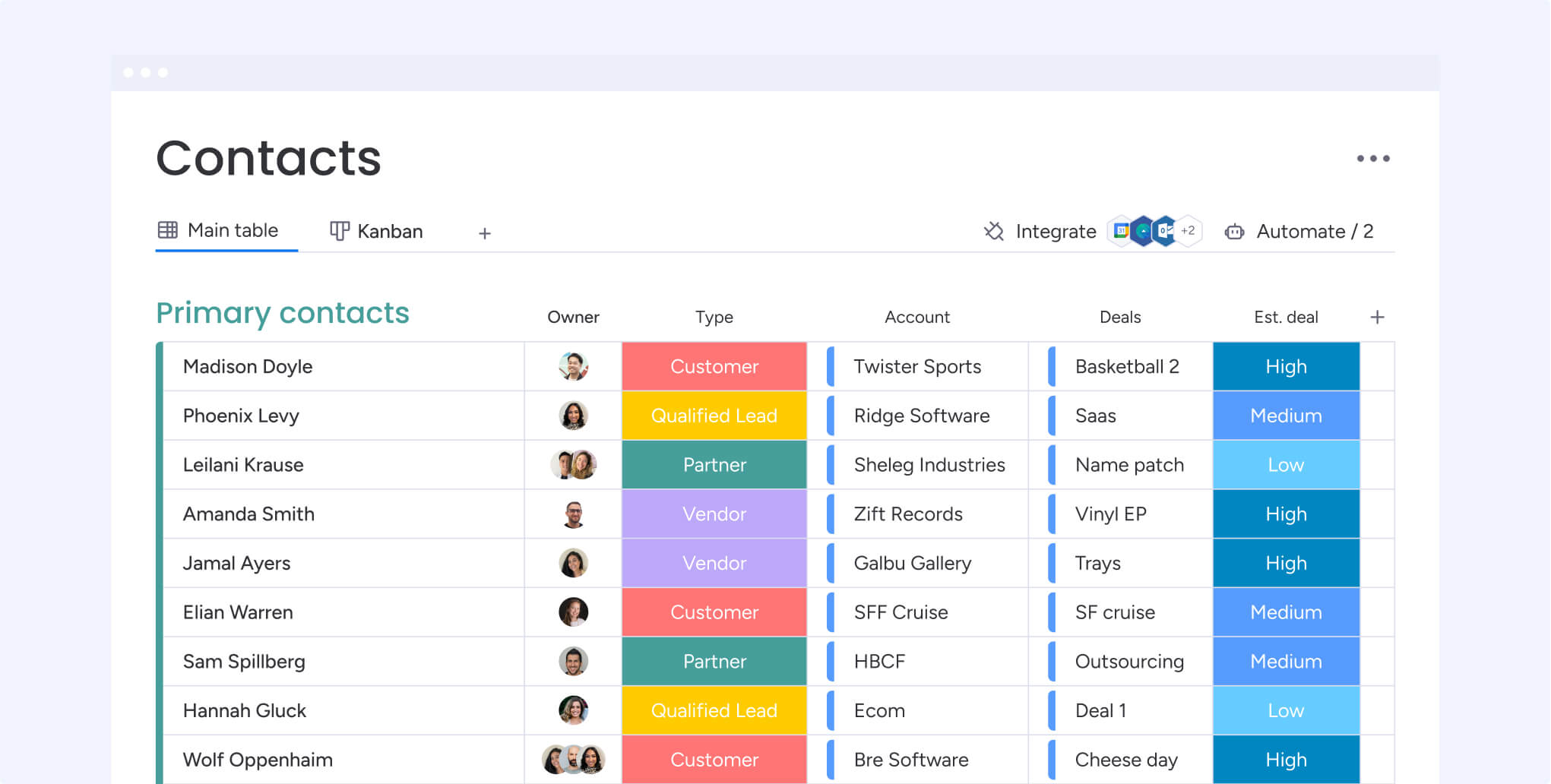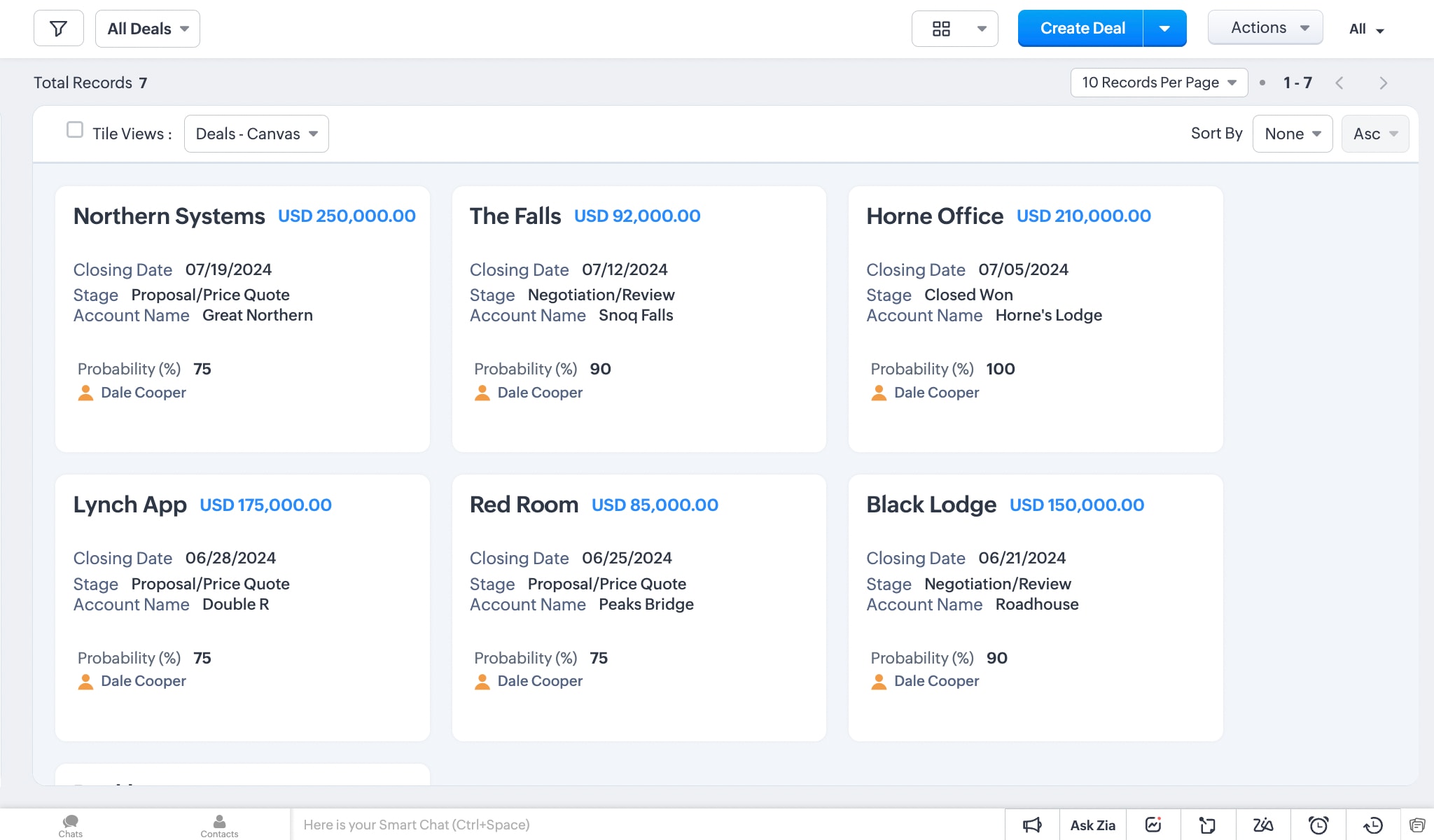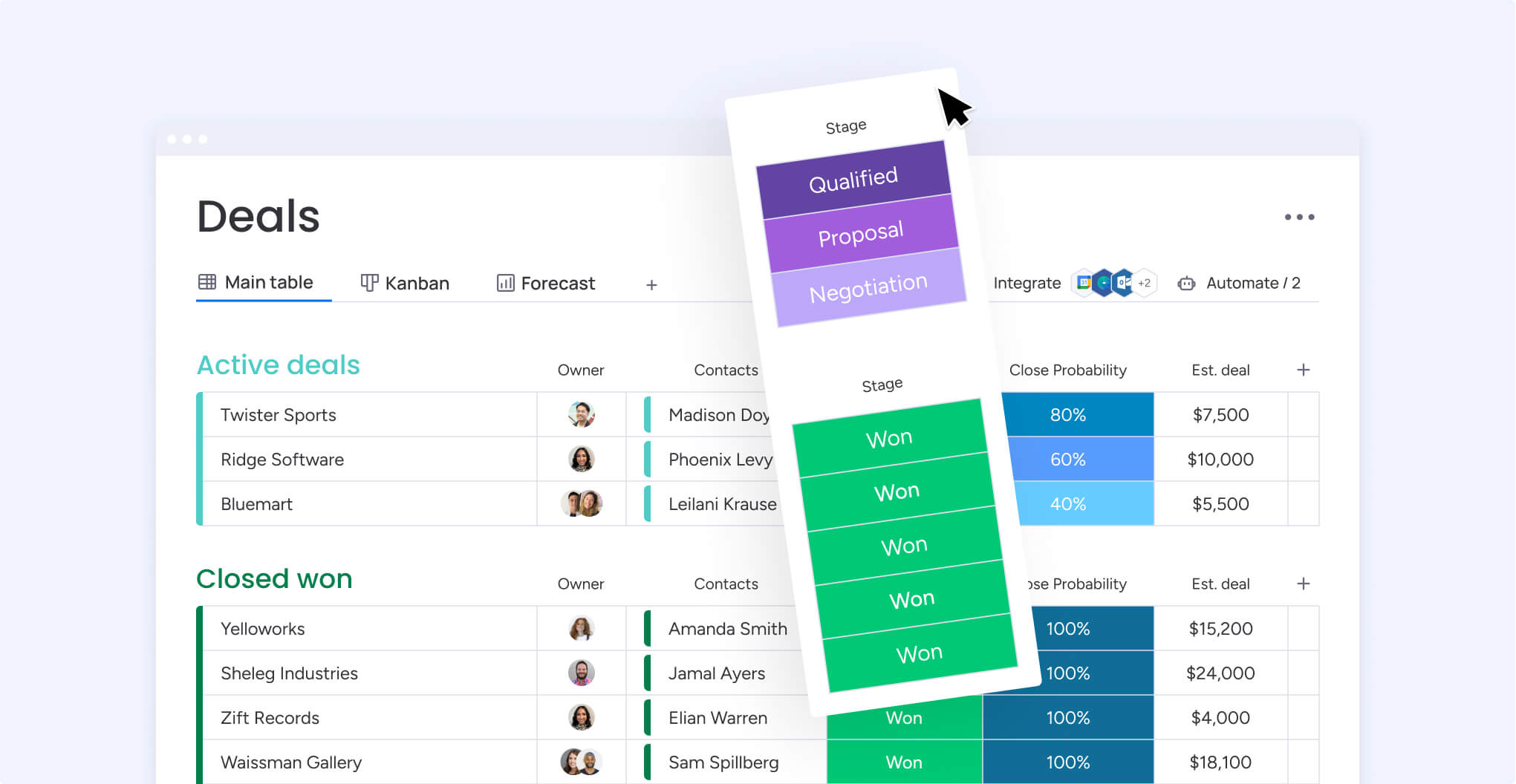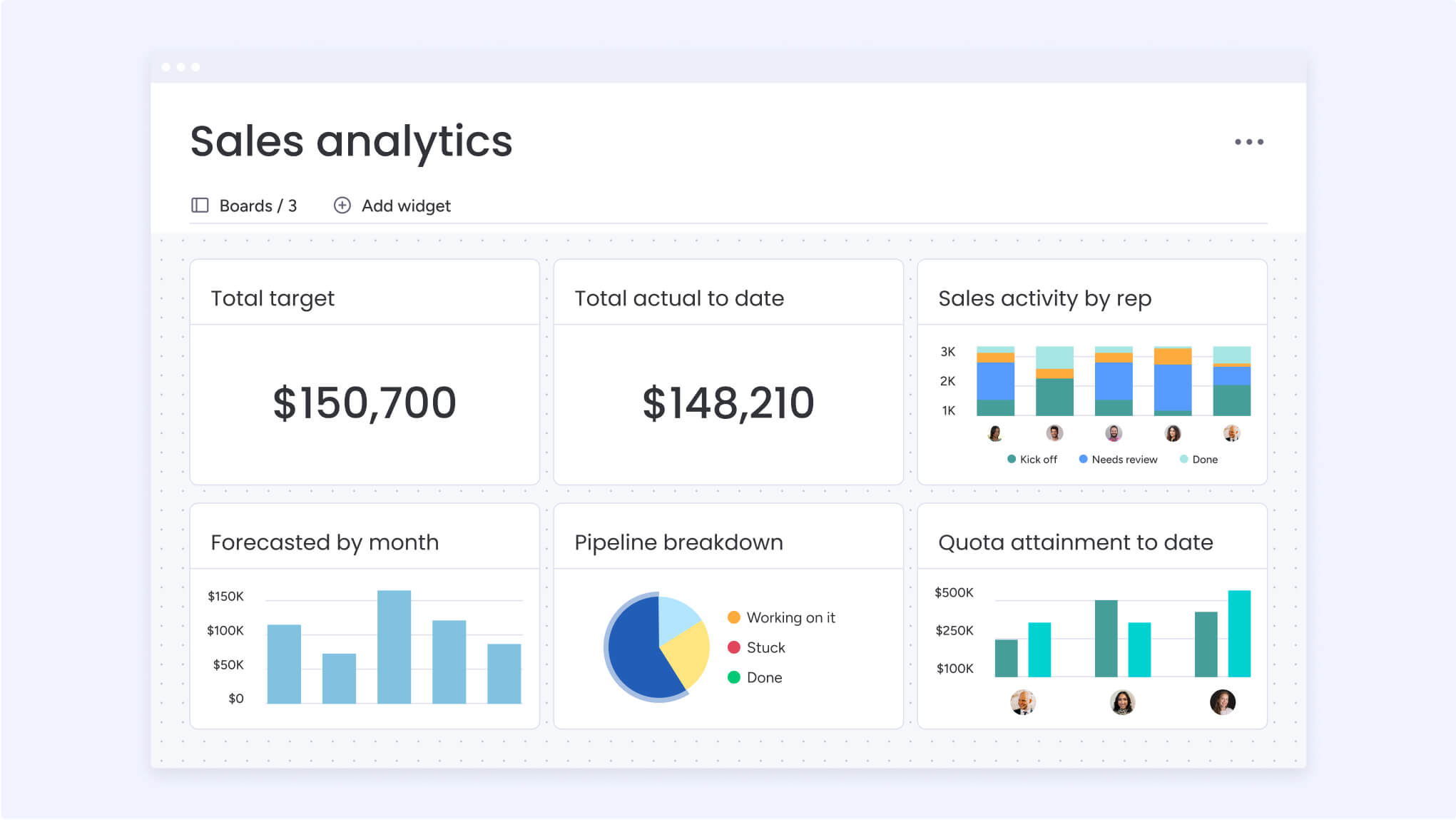A CRM can help you and your team manage and nurture your customers, but if you’re a small business just starting out, the cost of new software can feel like a burden. Luckily, there are a few great free CRM options out there that don’t require a credit card.
Free CRMs are a great way to dive into the possibilities that this type of software offers without having to worry about subscriptions and commitments. You can test out the CRM tools you’re interested in to get a better idea of the features that might really be worth the investment.
This blog post will guide you through a list of the best free CRM platforms on the market, as well as some tips on what to look for in free software and why a complete solution like monday CRM makes for a great choice.
Try monday CRMWhat is a free CRM?
Customer relationship management software, or CRM for short, is a solution that helps businesses of all sizes nurture leads and improve customer engagement.
Whether to increase loyalty or convert more leads, CRM software can help you manage your customers in all stages of their journey.
When it comes to free software, there are plenty of options for a free CRM out there. However, while free platforms can be enticing, they’re not always a good fit for every kind of project or team.
Who is a free CRM right for?
Free CRMs are often limited in their features and capabilities, making them hard to scale. Still, there are instances where a free CRM can be the right choice, for example:
- Independent workers looking to better manage leads and clients
- Small teams like home businesses or startups looking for a basic platform
- Companies looking for an independent platform to handle a small project
- Businesses with a very limited budget who need basic CRM functionality
Benefits and drawbacks of a free CRM
Not too long ago, CRM software would have been too expensive for the average small business owner. Today, CRMs come in all shapes and sizes, from mobile apps to robust platforms with extensive features. While it can be tempting for any business to opt for a free option, there are benefits and drawbacks to these costless platforms. Let’s take a closer look.
Benefits of a free CRM
- Cost-effective: Probably the main advantage is that these platforms are ideal for small teams or startups with limited budgets
- Basic features: Free CRMs often include only the basic tools which makes them straightforward and not too complex
- User-friendly: Free CRM solutions tend to be designed for easy setup and a minimal learning curve, making them appealing to any type of user
- No long-term commitment: Businesses can test a CRM before upgrading or investing in a premium plan
Drawbacks of a free CRM
- Limited functionality: Advanced features like automations, analytics, and customizations aren’t available, with these features being what makes teams work more efficiently
- Storage constraints: Free software often only includes limited data storage, which can become an issue as your business grows and requires unlimited contacts and users
- User limits: Sometimes you can only use a free platform for a couple of users, making them irrelevant if you have a few members on your team
- Support challenges: Accessing customer support may be restricted or slower compared to paid options
Features to look for in a free CRM
When considering your options for free software, it’s important to understand that the features you can access will likely be limited. For a free CRM platform, you want to look for some basic capabilities that will make it easier for your team or business to manage leads and customers. Before settling on a free CRM, make sure it has at least these basic features:
- Contact management: Store, organize, and manage contacts, customers, and leads in one place
- Pipeline visualization: Get an overview of leads in each sales stage for better deal management
- Task management: Assign and track tasks for timely follow-ups and accountability
- Email integration: Sync emails to streamline customer communications, email tracking, and customer interaction
- Collaboration tools: Features like shared notes, chats, commenting, or file sharing can boost team productivity
- Ease of use: Free tools should be simple to onboard and include intuitive interfaces that make it easy to manage tasks and collaborate
Of course, CRMs have many other premium features like automation tools, AI assistants, customizable work views, security controls, and more, but these often require a paid plan. If you’re not sure whether you need a paid CRM or a free one, consider opting for a CRM with a free plan or free trial and testing it out to see if there are more functionalities that you could benefit from.
The best CRMs for your business
Choosing a free CRM may seem like less of a commitment than subscribing to a paid platform, but that doesn’t necessarily mean the decision-making process is quicker. It can be time-consuming to try out different free platforms to see which one best fits your workflow. Below, we’ll look at a few of the top free CRMs for your business and their key features including platforms that offer free trials and free forever plans.
1. monday CRM

Best for: Teams of any size looking for a visually intuitive and customizable CRM
monday CRM combines a visually appealing interface with easy-to-use tools to make managing business relationships a breeze. The platform is perfect for small businesses or teams that require customization and a single platform with strong task management capabilities. While there isn’t a free forever plan, monday CRM’s flexible pricing makes it a feasible option for teams of any size.
Key monday CRM features
- Visual interface: monday CRM includes a simple drag-and-drop interface that makes it intuitive and easy to use
- Third-party integrations: Seamless integration with other productivity tools like Slack, Google Workspace, Zoom, and 200+ other applications
- Workflow automations: Create tailored automations to instantly follow up with leads, set reminders, and put manual tasks on auto-pilot
monday CRM pricing
- 14-day free trial to test out the platform
- Flexible pricing starting from $12/user/month based on exactly the number of users you need
- Learn more about monday CRM plans and pricing
2.HubSpot CRM
Best for: Small businesses looking for a free CRM that connects with other HubSpot products
HubSpot CRM offers plenty of features for managing contacts, a visual sales pipeline, and tools for marketing teams. The platform is known to be easy to use and can scale as your business grows. For teams already using other HubSpot products, this CRM integrates seamlessly for easy workflow and customer data management.
Key HubSpot CRM features
- Contact management: Store and manage up to 1,000 contacts in a free account
- Deal pipeline: Visualize your sales process and deals in a pipeline and predict future revenue
- Marketing tools: Access email marketing automations, forms, and ad tracking features to support lead generation
HubSpot CRM pricing
- Free forever plan for a maximum of 2 users
- Limited features such as email sends per month, automations, contacts, forms, and more
- Paid plans start from $12/user/month
- Learn more about Hubspot CRM plans and pricing here
3. Zoho CRM

Best for: Small teams or home businesses looking for a feature-rich CRM
Zoho CRM is a versatile platform that offers a wide range of sales tools and features for marketing, and customer service. Its free plan is well-suited for smaller teams, providing essential tools to create a basic customer experience without being overly complex.
Key Zoho CRM features
- Lead management: Track and nurture leads effectively with built-in tools like forms, analytics, and more
- Automated sales: Create up to five workflow automations with the free account to help you with routine manual tasks
- Email marketing: Sync your email accounts and create campaigns using email templates, workflows, and personalization
Zoho CRM pricing
- Free forever plan
- Free plan limited to three users with essential features like leads, documents, and mobile apps
- Paid plans start from $14/user/month
- Learn more about Zoho CRM’s plans and pricing here
4. ClickUp
Best for: Small teams that want to combine project management with CRM functionality
ClickUp is a flexible platform that blends task management with basic CRM features. It’s a great choice for teams that need a unified solution for managing customer relationships alongside internal projects. The free plan includes some basic customization options that make it suitable for small teams.
Key ClickUp features
- Pipeline view: Visualize the deals you have in your pipeline so that you can nurture each lead at the right stage
- Multiple work views: Organize your tasks, contacts, and data with Calendar, Kanban, and Everything views
- Collaboration tools: Includes chat, comments, whiteboards, and collaborative documents for easily working together
ClickUp pricing
- Free forever plan
- Free plan is open to unlimited users tasks but has limits on storage space, dashboards, custom fields, views, and other features
- Paid plans start from $7/user/month
5. Bitrix24
Best for: Small businesses seeking a free, all-in-one CRM and collaboration platform
Bitrix24 provides a complete suite of CRM, communication, and project management tools. Its free plan is packed with features, making it ideal for startups and small businesses on a tight budget. It also supports integrations and includes cloud-based storage.
Key Bitrix24 features
- AI assistant: CoPilot, an AI assistant, comes with the free plan and helps teams with sales forecasting, scoring, content generation, and more
- Sales automation: Automate repetitive tasks and sales activities like follow-ups, messaging, pipeline management, deal status updates, and others
- Reports and analytics: Get access to business reports to get deep insight on sales funnel, employee and business performance, and other insights
Bitrix24 pricing
- Free forever plan
- Free plan is open to unlimited users but is limited to 5GB of storage and access to advanced features like automation, marketing tools, sales management, and more
- Paid plans start from $43/month
Get a free trial with all the features you need with monday CRM
There are some great free CRM options on this list, but as is the case with most software, the free versions just don’t stack up to what you can accomplish with a paid plan. Some platforms, like monday CRM, offer very affordable introductory plans that are great for small teams, giving you the flexibility to access the CRM features you need at a price point you’re comfortable with.

monday CRM, part of the monday.com Work OS, makes it easy for teams to build any type of workflow they need. Whether it’s building a custom pipeline to manage deals or handling daily tasks and customer-facing projects, monday CRM balances flexibility and a user-friendly interface with enough robust features to handle complex workflows and help your sales team scale as needed.
Aside from the functionalities we already highlighted above, monday CRM includes additional features that make it an excellent platform for growing teams:
- Assign tasks or leads to specific teammates and track progress with ease
- Efficiently and visually manage the different stages of your sales pipeline
- Build forms with custom fields and send them to customers for easy onboarding or surveys

- Track every customer interaction, add notes, and measure how specific deals progress
- Streamline your sales processes and get the most out of your budget with automation features
- Hundreds of templates make it easy to get started no matter what industry you’re in
- Robust sales analytics dashboards and customer reporting to always stay on top of progress and performance

- 27+ different work views including Calendar, Gantt, Timeline, To Do List, and others to visualize work your way
- AI to help you automate task generation, email composition, content generation, and more
- Take your CRM with you anywhere you go with a mobile app so that you’re always in the loop
Get the most out of your free CRM
Whether you opt for a free trial or an entirely free CRM software, the most important thing is that you opt for a platform that can grow as your team evolves. If you’re looking for a free CRM now because your team is small and your budget is tight, consider what your future business needs might be based on your goals and look for a platform that will grow with you, like monday CRM. With a scalable CRM, you can make sure your business is set up for success from day one so that you don’t need to switch to an entirely new platform down the line.
FAQs
What marketing features do free CRMs offer?
Marketing teams can make a lot of use of CRMs with features for email campaigns, lead capture forms, ad tracking, and reporting. Advanced features like marketing automation, however, are usually reserved for paid plans.
What is the simplest CRM to use?
The simplest CRM will be the one that fits your team’s needs and is easy to use within the context of the goals you need to accomplish. Choosing a flexible solution like monday CRM where you can customize the platform to your needs will make it easier in the long run.
How can sales professionals make the most of a free CRM?
Any sales rep can maximize a free CRM by keeping contact data updated, relying on pipeline tracking for deal management, and using automations and reminders to stay on top of follow-ups.
 Get started
Get started 
